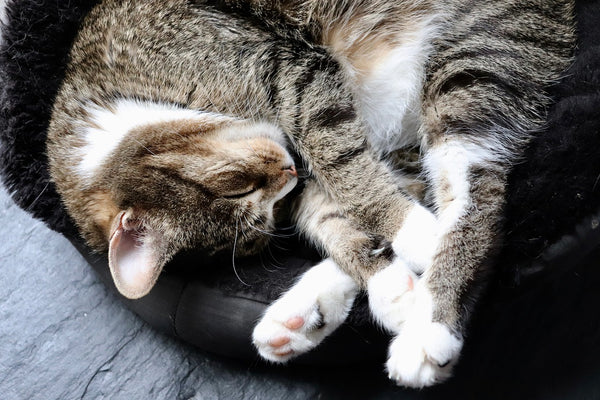Unraveling the Mystery of Cat Sleeping
Cats, those enigmatic and graceful creatures, have earned a reputation for their love of sleep. From luxurious stretches to cozy naps, their slumber-filled lifestyle has fascinated pet owners for generations.
Why do cats sleep so much? Do you know when do they prefer to snooze? Here let's delve into the reasons behind their excessive sleepiness, explore whether they're night owls or daytime dreamers, and uncover the intriguing factors that contribute to their sleep patterns.

The Cat's Slumber Secret
- Evolutionary Background: Cats are descendants of solitary hunters, whose energy expenditure was reserved for short bursts of intense hunting. As a result, cats have retained their ancestors' inclination for conserving energy through extended periods of rest.
- Metabolic Efficiency: Cats are obligate carnivores, requiring a protein-rich diet for sustenance. Their efficient metabolisms allow them to extract maximum energy from their meals, but this efficiency also means they can afford longer periods of rest to recharge.
Nocturnal or Diurnal: When Do Cats Prefer to Sleep?
- Crepuscular Behavior: Contrary to the popular belief that cats are purely nocturnal, they are actually crepuscular animals. This means they are most active during dawn and dusk. This behavior harkens back to their evolutionary history as hunters, as many prey animals are active during these times.
- Daytime Dozing: Cats often take short naps throughout the day, typically lasting about 12-16 hours in total. These naps are more frequent in older cats, kittens, and indoor cats who may not have the same energy expenditure as outdoor cats.
- Nighttime Activity: While cats aren't fully nocturnal, they do exhibit increased activity during the night. This behavior might be influenced by factors such as a cooler environment, reduced competition for resources, and the dim lighting that mimics the twilight hours when they would naturally be hunting.
Factors Influencing Cat Sleep
- Age and Development: Kittens and young cats require more sleep than adults, as their bodies are actively growing and developing. As cats mature, their sleep patterns tend to stabilize.
- Health and Environment: A cat's overall health, comfort, and environment play a significant role in their sleep patterns. Stress, illness, and changes in routine can lead to altered sleep behavior.
Cats' reputation as sleep enthusiasts can be traced back to their evolutionary history as solitary hunters with efficient metabolisms. While they are not strictly nocturnal, their crepuscular behavior allows them to balance periods of daytime rest with heightened activity during dawn and dusk.
Understanding the reasons behind their sleep patterns and recognizing their individual needs can help us provide the best care for our feline companions. So, the next time you catch your cat enjoying a cozy nap, you'll know it's all part of their nature's design.